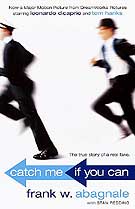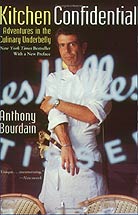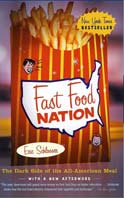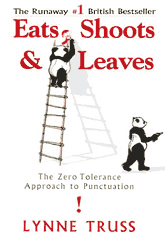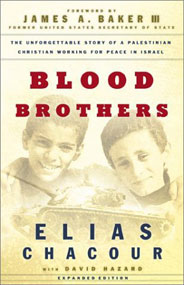Catch Me If You Can by Frank Abagnale is an amazing true story of the adventures of a master con artist and check forger. Of all the books I’ve “read” from Audible.com, this is among the most enjoyable. In his late teens, Abagnale posed as a PanAm co-pilot, getting lifts on airplanes for free to take him all around the country and the world, allowing him to pass bad checks behind the guise of a respectable airline pilot. By the time he was caught, at age 21, he had managed to bilk his victims, mostly PanAm, of over 2 million dollars. At that was 2 million in the late 60s, when the story took place. Posing as Frank Williams, Robert Conrad, Frank Adams, and Robert Monjo, Abagnale also managed to teach sociology at a college in Utah with a fake diploma, pass the bar exam and work in an attorney general’s office, pose as a pediatrician and become a temporary resident supervisor at a hospital in Georgia.
Category Archives: Non-fiction
Kitchen Confidential – Anthony Bourdain
Kitchen Confidential: Adventures in the Culinary Underbelly by Chef Anthony Bourdain tops many a recommended reading list on my favorite food weblogs. So when I noticed it on the book list at Audible.com
, narrated by the author himself, I snatched it up. It does not disappoint. Kitchen Confidential is a rollicking, crude, hysterical, and sobering account of life behind those kitchen doors at the best restaurants in New York City. Bourdain pulls no punches in his storytelling, honestly copping to his early career addictions with drugs and alcohol. Of note is his revelation of why he is not the best chef – that early on he went for the money instead of apprenticing himself at lower pay to the real masters. This book has tips on cooking like a chef – what knives to buy, kitchen equipment really needed, insights on why more restaurants fail than succeed, and presents Bordain’s code of values and behavior that will help you succeed should you choose the professional culinary life.
Fast Food Nation – Eric Schlosser
So many people had recommended Fast Food Nation by Eric Schlosser that I bought the audiobook on Audible.com and listened to all 9 hours. I have mixed opinions about it. On the one hand Schlosser does a wonderful job describing the history of the fast food industry with terrific case studies of McDonalds and Carl’s Jr. Visionary entrepreneurs brought America efficiently prepared meals at prices low enough to make the food affordable to all. Schlosser also expertly delves into the the structure and participants of the entire industry, from the meatpackers and potato farmers to the franchisees and corporate marketeers. The research effort that went into this book are well deserving of praise. I was especially bothered to learn about how in-bed fast-food marketers have become with our public schools, with the schools pimping junk food to students in order to raise revenue. It is shameful that we are trading off the health of our children for the tax dollars that should be going into our schools.
Eats, Shoots and Leaves – Lynne Truss
Note to self: use more semi-colons.
Lynn Truss has written a delightful best-seller on the art of using commas, apostrophes, and semi-colons in her Eats, Shoots & Leaves: The Zero Tolerance Approach to Punctuation. After reading this book all I can think of is that I need to use semi-colons more often. Eats, Shoots & Leaves is both a useful guide to punctuation (primarily from a British perspective) and a witty and humorous rant against the declining use of proper punctuation in our culture. Ms. Truss frequently delves into the historical roots of many of the punctuation and type formatting standards we take for granted today.
How could a book on punctuation make it to the best seller list and stay there for… how many months has it been? One reason is by being well written and entertaining. Another reason is that those of us who read books also often like to write. Since the dawn of email and the Internet we’ve been writing much more than we would ever have expected to. As such, many of us are on the one hand appalled by the lack of proper punctuation populating the emails of those born around the same time as the personal computer, and on the other hand trying to remember what exactly those rules were that we learned so long ago. Eats, Shoots & Leaves appeals to us for both reasons; Truss lambasts the awful punctuation she sees daily while gently explaining the guidelines for doing it right. (I did it! I used a semi-colon in a sentence!)
Blood Brothers – Elias Chacour
Elias Chacourt is a Melkite Catholic priest and a Palestinian. Blood Brothers is at once the story of Elias’ life growing up by the Sea of Galilee and an impassioned plea for reconciliation between the forces that have torn that area apart during this last century. It is a simple, beautiful, and deeply moving story of one man’s work to heal the conflict in his homeland. The title comes from Elias recalling his father inviting Jewish neighbors in for tea when Elias was a young boy, explaining to the children that the Jews and the Palestinians were “Blood Brothers” as they shared the same father Abraham.
What is so striking to me is the absence of a balanced view of the Israeli Palestinian conflict in what we Americans have been told over the last several decades by our government and the press. What most Americans do not know is that in the late 40s the Israeli zionists forced the Palestinians off of the land on which they and their ancestors had lived for hundreds of years, thus setting off the division and conflict that we live with today. No wonder Palestinian militants are blowing themselves up. They want their land back.
Why Catholics Can’t Sing – Thomas Day
When my brother John first told me about Why Catholics Can’t Sing, I nearly fell off my chair laughing. Someone had actually written a book about this phenomenon? Every since I started going to church again after a several year absence I have been complaining to all who would listen about the atrocious music sung in Catholic masses these days. It’s not that Catholics can’t sing, it’s that they don’t. Who wants to sing unremarkable music? I love to sing and I rarely do in mass. The reason is that most of the music is some 70s holdover sappy pop folk stuff that hurts my ears to hear, especially when accompanied by guitar strummers. Whatever happened to the music I loved as a little girl in the early 60s? Faith of our Fathers, O Santissima, Holy God We Praise Thy Name? When I asked my mother why our music was so bad, especially compared to that of the Episcopalians, she replied that 1) we believe that the music should not detract from the mass, and 2) that great church music sounds too much like Protestant music and we need to be different. Not that she believes either of these reasons to be sufficient justification for bad music, it’s just that these are the reasons that are typically given.
Detract from the mass? What is more of a distraction than poorly sung bad music? Try to be different from the Protestants? Why? We have the most beautiful, glorious music in our Catholic heritage and no one is growing up knowing it.
